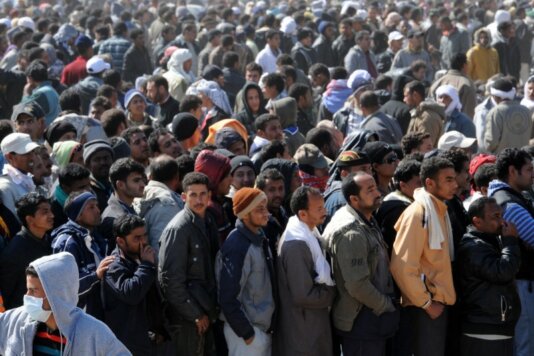- About
- Topics
- Picks
- Audio
- Story
- In-Depth
- Opinion
- News
- Donate
- Signup for our newsletterOur Editors' Best Picks.Send
Read, Debate: Engage.
| topic: | Refugees and Asylum |
|---|---|
| tags: | #migrants, #climate crisis, #cradle to cradle, #opinion |
| located: | Germany |
| by: | Nora Sophie Griefahn, Tim Janßen |
The global refugee crisis has unfortunately disappeared from the public eye, but it has by no means been resolved.
In the past decade, the number of refugees fleeing conflict and persecution worldwide has doubled from 10 to 20 million. Adding climate change and resource scarcity to the causes for flight, the number increases to 97.5 million people, according to the UN. The consequences of the COVID-19 pandemic will significantly add to the suffering of many and increase the number of those fleeing their homes.
An independent expert commission established by the German government has now outlined how we can fight the causes of migration.
Much of the circular approach Cradle to Cradle stands for is dedicated precisely to addressing the issues highlighted by the expert commission as the main causes for flight: environmental destruction, the depletion of finite resources and climate change.
A C2C economy could eliminate all three causes through the consistent use of renewable energy, the infinite use of finite resources, and closed CO2 cycles. A stable, resilient C2C economy would also ensure sustainable jobs and prosperity; the overexploitation of nature and the scarcity of raw materials as a cause of social tensions would thus be reduced and conflicts diffused.
"The triggers for conflict," the report says, "are often rooted in or exacerbated by poverty and hunger, lack of economic prospects, political repression, or scarce resources." Here, too, the guiding principles of our work are reflected in the findings of the commission: "Secured livelihoods and development prospects are important preconditions for people to remain in their homelands."
So it is no coincidence that the co-chair of the commission, a long-time director of Welthungerhilfe, Bärbel Dieckmann, is a member of C2C NGO's board of directors.
There is substantial overlap among the goals pursued by all of these organisations. They all strive to conserve resources for future generations, thereby creating the conditions under which living beings and the environment can thrive and prosper.
After the publication of the commission's report, it is essential that governments join this fight and immediately start implementing the solution strategies the report has lined out, with one of them being to intensify the fight against global warming and the waste of resources.
Flight and environmental problems do not know borders, therefore only a joint global effort will be enough to tackle these intertwined problems.
Image: Caritas Europa.
